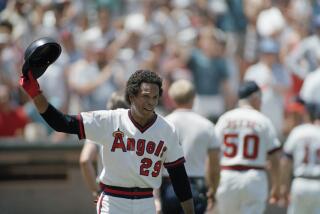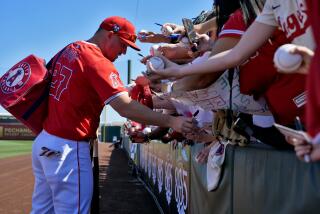A Snow Job?
SCOTTSDALE, Ariz. — A National League scouting book sits in his locker, and J.T. Snow spends part of each day learning about his new league.
The former Angel first baseman, acquired by the San Francisco Giants for pitcher Allen Watson in November, says he has turned the page in another way as well.
“I have no ill feelings toward the Angels,” said the two-time Gold Glove winner, who attended Los Alamitos High in the shadow of Anaheim Stadium.
“I thanked [General Manager] Bill Bavasi for making a kid’s dream come true. I got to play in a stadium I grew up watching games in. Not many players get to fulfill a dream like that.
“It was a fun time, fun to put that uniform on every day.”
But to look back, Snow said, is to lose sight of the new challenge.
“It’s like starting over, and I’m excited,” he said.
“I wasn’t that much aware of the situation in San Francisco, but they’re basically bringing in a bunch of new players and I feel good to be part of the puzzle they’re trying to piece together.”
Yesterday’s pieces--including Will Clark, Robby Thompson, Royce Clayton and Matt Williams--are gone. The Giants will have a new infield in 1997, with Snow at first, Jeff Kent at second, Jose Vizcaino at short and Mark Lewis at third.
Manager Dusty Baker, owner Peter Magowan and new General Manager Brian Sabean, the New York Yankees’ farm director when Snow was a prospect in that system, all called to welcome him on the night of the trade.
It has been a comfortable transition, he said, but when forced to look back . . .
“The one thing that bewildered me about the trade is that I thought [the Angels] would go out and get an everyday first baseman,” Snow said.
“They said they wanted more production out of the infield corners, and I agreed with that. I’d be the first to admit I didn’t do what I should have last year, that I wasn’t as productive as I’d been the year before. But then they signed Eddie Murray, and from what I hear he’s going to be a designated hitter basically and they’re moving Darin Erstad [from the outfield] to first base.
“Erstad is a young player with a lot of talent, but he’s not a proven first baseman or run producer. That’s the part that surprised me.”
One of the Angels’ winter goals was to change the chemistry, create more intensity.
It started with the hiring of a firebrand manager, Terry Collins, and the addition of in-your-face players like Dave Hollins and Jim Leyritz.
Club President Tony Taveras has said there were times in 1996 when the Angels seemed to be a team that didn’t care.
Amid the changes, two of the Angels’ most popular players, Chili Davis and Snow, were traded for starting pitchers.
Whether Watson and Mark Gubicza fill that need remains to be seen. In Snow’s case, there seemed to be more to it.
The Angels had thought enough of the first baseman to give him a three-year, $6-million contract at the start of the ’96 season.
At the end, the Angels were looking to cut their losses--in more ways than one. Sources say Taveras, angered over the team’s effort and performance, demanded Snow be traded. The Angels even tossed in $750,000.
A baseball decision, Taveras said through a club spokesman, that rested with Bavasi, who said Snow was traded because of the need for pitching and he simply proved to be a better option than an Erstad, Jim Edmonds or Garret Anderson.
Perhaps, but the impression lingers, as if management believed Snow was a key contributor to the perceived complacency. A scapegoat?
“No way,” Bavasi said. “Any of our coaches from last year would tell you they’d go to war with the guy. He’s an intense competitor, a good kid.”
Snow shook his head. A scapegoat? For what?
He disputed the view that the Angels “lacked fire or were too laid back.”
The chemistry, he said, was there, the clubhouse devoid of egos and jealousy. “You had a group of young players starting to grow into leadership roles,” he said. “You had five or six guys getting 500 at-bats, out there every day busting their tail.
“So much was expected last year, and when we didn’t come through, I just think they felt a need to bring in new faces and see if they could jump start it again.
“I mean, there were a lot of distractions last year, and everybody in that clubhouse would tell you they didn’t do the job they should have.”
From a playoff for the American League West title in ‘95, the Angels collapsed, finishing last, 19 1/2 games behind the Texas Rangers.
The spiral started, Snow said, with the failure to re-sign leadoff man Tony Phillips.
“That was huge,” he said, but he also cited:
Injuries to the pitching staff, a change in ownership, the death of batting coach Rod Carew’s daughter--”It was like we were in a fog for two or three weeks; Rod’s absence was absolutely devastating to a lot of the guys”--and Manager Marcel Lachemann’s uncertain status and eventual resignation.
As production fell throughout the lineup, Snow failed to duplicate his .289 average, 24 homers and 102 runs batted in of 1995 and offered no excuses then or now.
A switch-hitter, he batted .257 with 17 homers and 67 RBIs, batting only .199 with three homers and 17 RBIs right-handed.
In an incident that he insists was “blown out of proportion” but which created the impression Lachemann wasn’t communicating and seemed to lead the front office to believe Snow was interested only in himself, he did not play two consecutive games against left-handed pitchers in Detroit in late July and wondered if he had become a platoon player.
“I don’t know if this is going to be a regular thing, but if it is, something should be said to me,” Snow said at the time. “The worst thing you can do is create a doubt in a player’s mind.”
In reflection, sitting in the Giants’ clubhouse, Snow said: “I don’t know if that had anything to do with my being traded, but I don’t regret what I said and don’t feel it was detrimental.
“The last thing I want to do is create a distraction in the clubhouse. That’s not my personality. I’m not that kind of player. It’s the manager’s job to put the lineup on the field. I want to win, that comes first. All I said was that no one had communicated anything to me. Maybe it was the wrong choice of words. In reality, I knew why I wasn’t playing.”
He wasn’t playing because he wasn’t hitting left-handers, and Rex Hudler, getting a rare start at first base, was. Snow’s problems from the right side remain a Giant concern.
An intestinal infection that developed last week has prevented Snow from appearing in any exhibition games, but he had previously been out almost every morning for extra work as Baker and staff tried to take his right-handed swing apart and reassemble it.
There has even been speculation that the Giants might ask Snow to stay strictly on the left side, but Snow said he continues to like his “chances better” as a switch-hitter.
“My goal is to close the gap,” he said, referring to that 1996 disparity in his right/left statistics.
Said Baker, the former Dodger who was a boyhood idol of Snow’s: “I didn’t really know J.T., but I talked to Chili, and Chili really likes him, which is good enough for me.”
A Gold Glove player at first base would seem good enough for any team, but not the Angels. They might deny it, but somehow, he came to be regarded as tarnished goods, which is why he is reading scouting reports on a new league.
More to Read
Go beyond the scoreboard
Get the latest on L.A.'s teams in the daily Sports Report newsletter.
You may occasionally receive promotional content from the Los Angeles Times.





